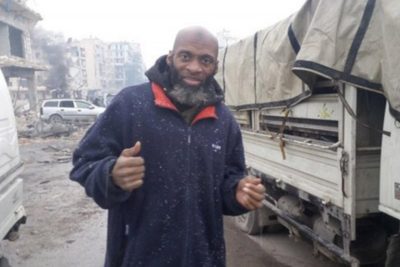Journalists in Syria on the US Drone ‘Kill List’

Featured image: Bilal Abdul Kareem, an American citizen and journalist working in Syria (Source: Twitter)
Two journalists have today filed federal court cases in the United States to challenge their inclusion on a classified US “Kill List”, Reprieve said in a statement.
Bilal Abdul Kareem, an American citizen and journalist working in Syria, escaped being killed by drone strike on five occasions, including two strikes on cars he was travelling in. Two additional strikes were executed on his independent news agency, On the Ground News, while he was working in the studio.
Ahmad Zaidan (image on the right), a senior reporter with Al Jazeera has appeared in a top secret SKYNET document, a US computer programme which has classified him as an Al-Qaeda courier based on “metadata”. Zaidan was the first person to interview Osama Bin Laden, Al-Qaeda’s former leader in the 1990s.
“Bilal and Ahmed are journalists, not terrorists. All they are asking for is the chance to prove it. Yet, the government seeks to deny them that chance. In doing so, he is asking the courts to jettison the very value, which sets America apart from dictatorships and despots – due process,” Jennifer Gibson, head of Reprieve’s drones project, said.
“The courts must not let him. The executive should not be allowed to act as judge, jury and executioner unchecked. In a country founded on the rule of law, these men have a right to challenge the government’s decision to kill them,” Gibson continued.
SKYNET, operated by the National Security Agency, pinpoints targets based on individuals’ mobile phone calls and travel patterns. It does not take into consideration any direct evidence to ensure legality, Reprieve said.
“The gove
rnment has acknowledged that it maintains a ‘Kill List’ of suspected terrorists, and that there is a process to determine who should be included on that list. The plaintiffs were incorrectly placed on the kill list. They have the right to make the case that the government got it wrong,” Tara Plochocki, parter at Lewis Baac Kaufman Middlemiss PLLC, said.
Kareem and Bilal seek to remove their names from the US “Kill List” or any other list from which individuals can be targeted for lethal action. The case will also seek to address whether the US followed its own internal procedure on listing individuals and what that procedure comprises of.
Under the drones policy inked by former president Barack Obama and continued by Donald Trump, only individuals who pose a “continuing, imminent threat to US persons” may be targeted outside war zones. But Reprieve, a legal action charity seeks to argue that Kareem and Zaidan are journalists who are provided special protection inside and outside war zones.
Obama previously warned high risk counter-terrorism operations should be used sparingly and only after internal review. Trump has sidestepped that rule and provided the Central Intelligence Agency (CIA) and the US Military broader powers. In addition, the US considers some countries “areas of activity hostilities” or temporary battlefields where looser targeting rules apply. US drone warfare has taken the lives of some 10,858 individuals since 2004, according to the Bureau of Investigative Journalism (TBIJ).

